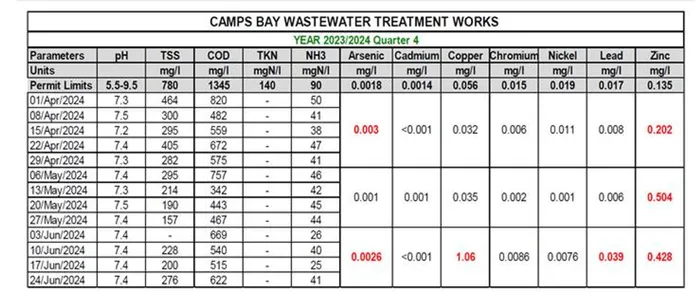‘Introduction of independent auditor contributes to transparency’

The red numbers show exceedances over the discharge restrictions at Camps Bay. These statistics were provided by the City.
The City of Cape Town says steps to decrease pollution in the Atlantic Ocean would include frequent monitoring, dispatching pollution control inspectors when illegal dumping is discovered, and adopting modern technologies such as effluent flow loggers to improve response times.
Last week the Atlantic Sun reported that the City had said there was a “slight” non-compliance with the amount of certain heavy metals present in the sewage being pumped out from its marine outfalls (“Heavy metals in marine outfall a concern”, Atlantic Sun, August 22).
This was after former Department of Forestry, Fisheries and the Environment (DFFE) Minister Barbara Creecy had last year overturned her decision to issue Coastal Water Discharge Permits, which allow the City to discharge sewage from marine outfalls into the sea, stating that the City had failed to inform interested parties that the permits had been obtained or to make a public notice about sewage release permits in 2019 and 2022.
Mayoral committee member for water and sanitation, Dr Zahid Badroodien, said there is an independent auditor whose tasks include sampling, analysis, and reporting in accordance with the permit requirements.
“The independent auditor will be verifying that the results are accurate and reliable and comparable to the regular internal testing and monitoring done by the Water and Sanitation Directorate. The auditor's role is critical in providing transparency and accountability in the monitoring of marine outfalls,” said Dr Badroodien.
The public was kept informed by the City through the Permit Advisory Forum held at the council chambers of the Civic Centre on August 2. The date of the next meeting is Friday November 22.
“The PAF serves as a platform where reporting on the marine outfalls is done and the introduction of an independent auditor also contributes to transparency by ensuring that the monitoring process is externally verified. The City has also embarked on an extensive three-year sea water quality monitoring programme around the marine outfall discharges,” said Dr Badroodien.
“Flow loggers are instruments used to measure the flow rate of effluent. They play a crucial role in monitoring the volume and speed at which effluent is discharged. Their introduction could improve the accuracy of monitoring by providing real-time data on effluent flow, thereby monitoring compliance with the permit conditions. It will also enable accurate flow weighted loading on the marine environment which has been recently requested by DFFE (Department of Forestry, Fisheries and the Environment),” said Dr Badroodien.
The investigation results regarding the non-compliance of certain heavy metals must be submitted to the Department by March next year, according to Peter Mbelengwa, the DFFE’s chief director for communication and advocacy.
“To address the concerns with heavy metals the Department instructed the CoCT to appoint a service provider to determine the sources of the non-compliant of heavy metals with a view to recommend at source treatment and to explore biological treatment options for heavy metals where required. The results of this investigation must be submitted to the Department by 1 March 2025, as requested by CoCT, to enable CoCT to include the sampling results of heavy metal monitoring into the report,” Mr Mbelengwa said.

Related Topics: